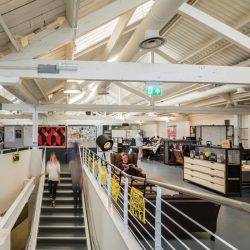With all challenges come opportunities. Covid-19 will most likely be the single largest challenge and disrupter of a generation. It has the potential to create the greatest significant shift in working behaviours and standards of the past hundred years. Workspace consultants, enlightened clients, designers, researchers and commentators have been hammering the agile / home/ remote working drum for the past twenty years or more, waiting patiently for this kind of opportunity.
All of a sudden it arrived, unexpectedly gift wrapped in a deadly virus. It’s almost as though the stars aligned to generate this particular, darkly compromised, opportunity. From recent, rapid advances in mobile technology and miniaturisation, digitisation of storage and instant, collaborative communication platforms, cloud based hardware and software, the nation wide rolling out of domestic high speed broadband, to the gradual cultural acceptance of agile working, typified by the rise and rise of WeWork.
It’s not a simple task, however, to successfully unearth, recognise and create the opportunity, whilst you’re still in the process of understanding, mitigating and managing the challenge. Challenges tend to be practical, functional, procedural, analytic and hard work. Opportunities often start conceptually or opportunistically, with an idea or observation, borne of specific or generalised need, they need refining, researching, testing, then testing again. Opportunities take time to develop, dependent upon complexity.
New opportunities
About 5-7 weeks into lockdown we talked to our clients.They talked about their challenges and opportunities managing Covid-19, at a purely experiential, personal and practical level. How did their business respond to the challenges, how were their staff managing. What did they implement, what worked, what didn’t. What did they learn and what are they continuing to learn. We also asked whether or not they were thinking yet about how this unique experience would shape their thinking about the value of the office and its purpose in the future, what opportunities it created or implied.
The value of the office is transitioning to become the social and figurative heart of the organisation
Their responses contained some interesting nuggets of practical and pragmatic considerations, supported by a series of observations, for example, most clients commented that they worked as or more efficiently as they had when working from the office. Other, very human, factors also emerged, those of dependency, care and support.
Each organisation quickly implemented measures to help manage the challenges of isolation, from mental health programmes, through to scheduling meetings and communications at a purely social level, often from the chairman or CEO, on occasion talking directly to individuals and staff groups.
What did we learn? Initially, it was the in-built capacity of each organisation to successfully manage and implement substantial change within a very short timeframe. It demonstrated that people, systems, processes and tools are flexible and can be adapted without significant loss of efficiency. That the majority of what we determine as ‘work’ is not tied to the office or even a physical location. We learnt that there’s a basic, instinctive need for collaboration which digital collaborative platforms struggle to fulfill.
What tentative conclusions could we offer, none with any certainty, but it does indicate that there’s a cultural and metaphoric transition happening. The office is losing its status as the symbolic, dominant centre of the organisation, where work is ‘done’. It is moving from a position of priority and significance into an object of collateral and support. The value of the office is transitioning to become the social and figurative ‘heart’, a place for physical collaboration, of identity and community, a place to re-enforce culture and values for staff and clients.
There are risks, inevitably, with assuming too much too early. Will the opportunity of home working wane over time as the autonomy and freedom it provides is balanced by the Groundhog Day reality. Will it end up being a novelty, with a shelf life. Will the lack of cross team and departmental communication and collaboration have a longer term impact that isn’t yet visible. Our intent is to re-engage with our clients in a couple of months and report again on their experiences, it’s been a fascinating challenge, full of opportunity.
"bitter" - Google News
June 09, 2020 at 01:11PM
https://ift.tt/3cROaBG
A thank you for the bitter knowledge offered by the lockdown - Workplace Insight
"bitter" - Google News
https://ift.tt/3bZFysT
https://ift.tt/2KSpWvj
Bagikan Berita Ini

















0 Response to "A thank you for the bitter knowledge offered by the lockdown - Workplace Insight"
Post a Comment